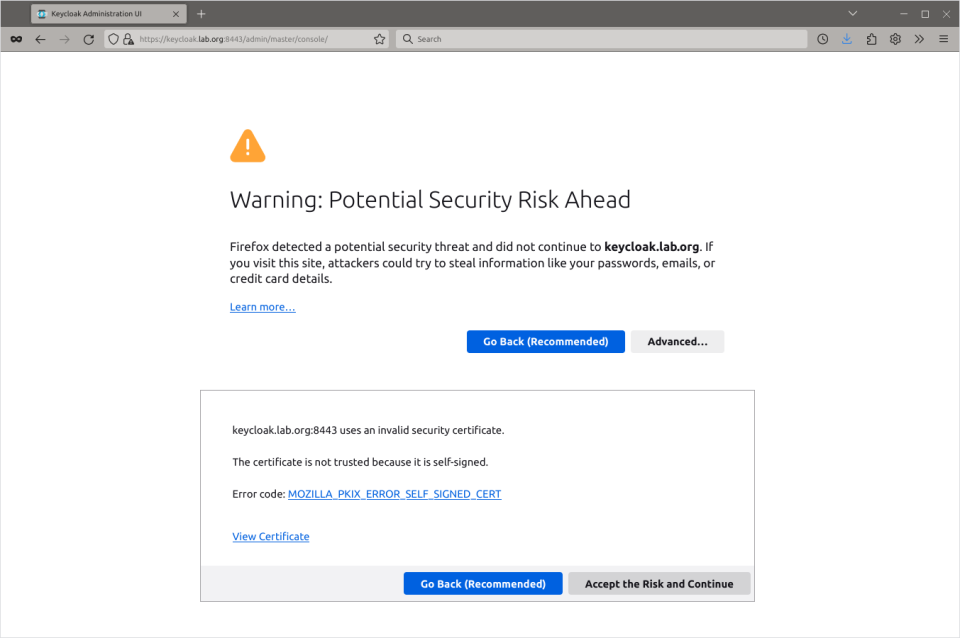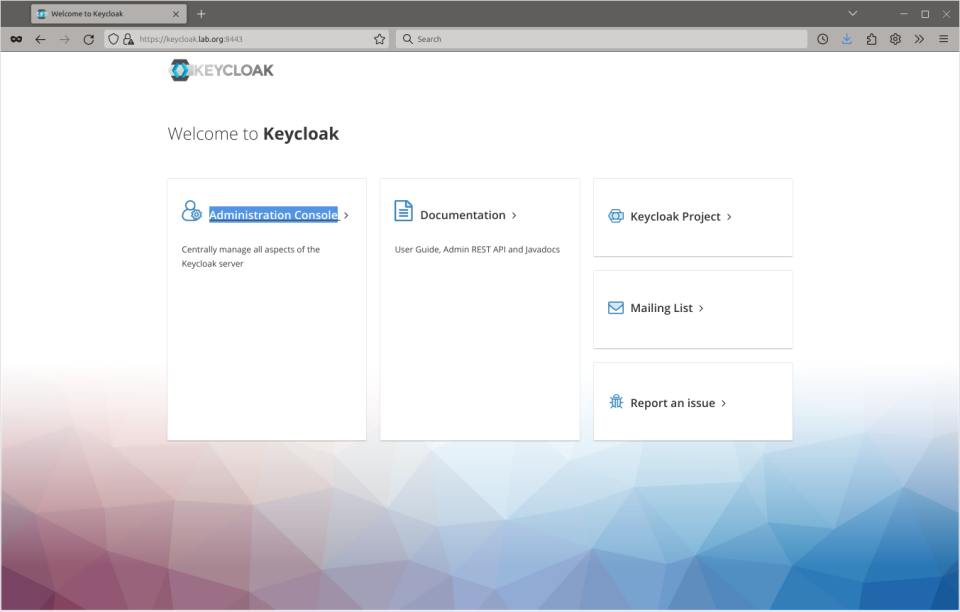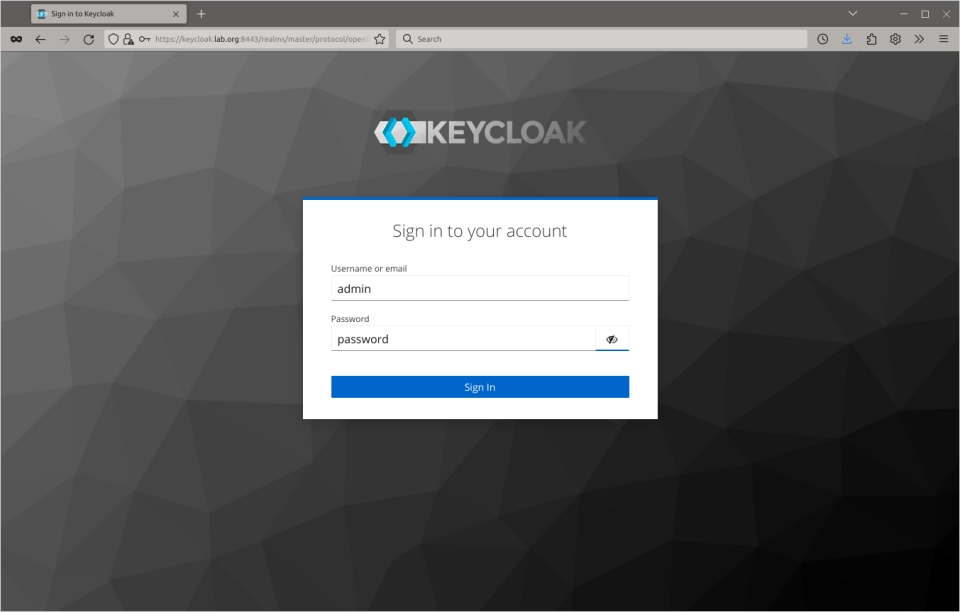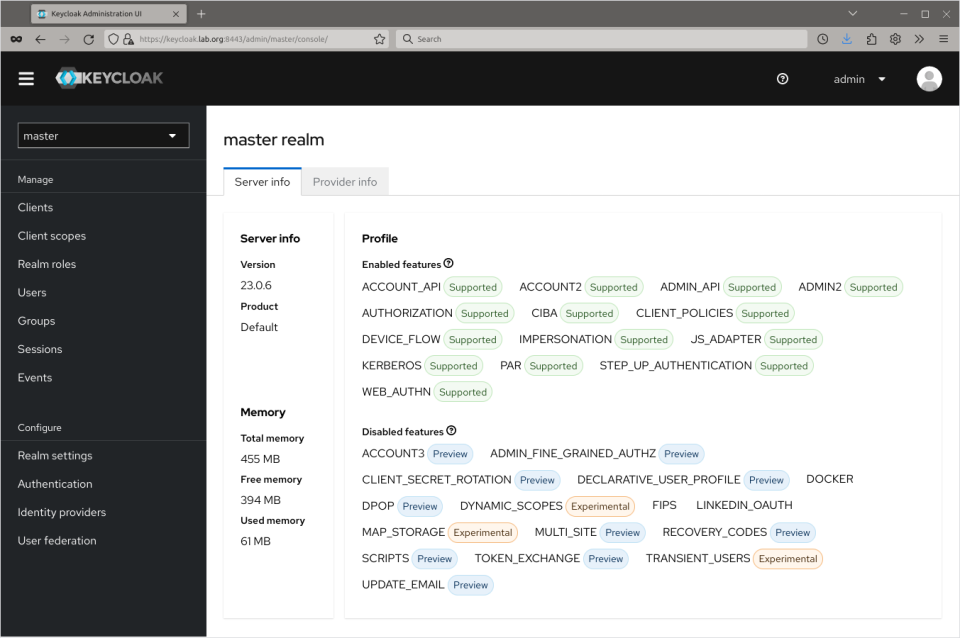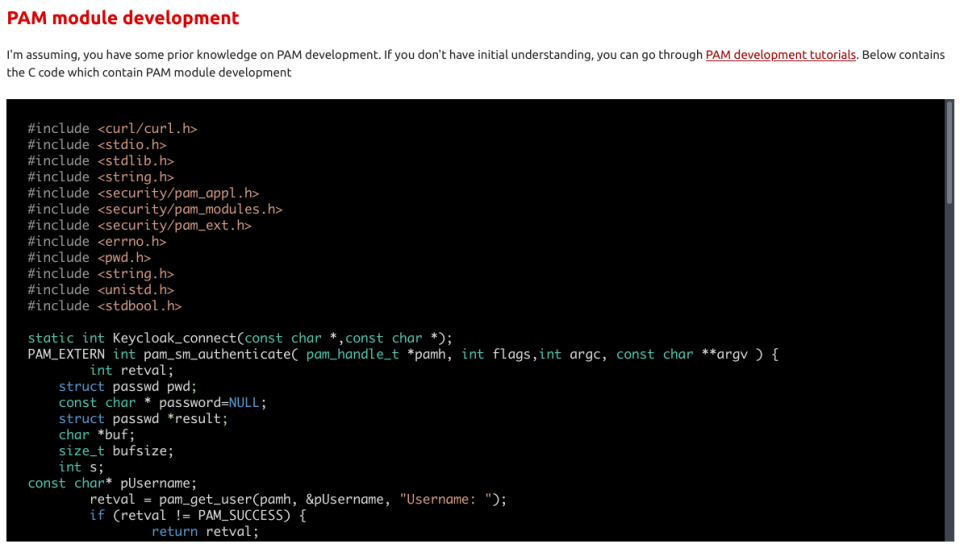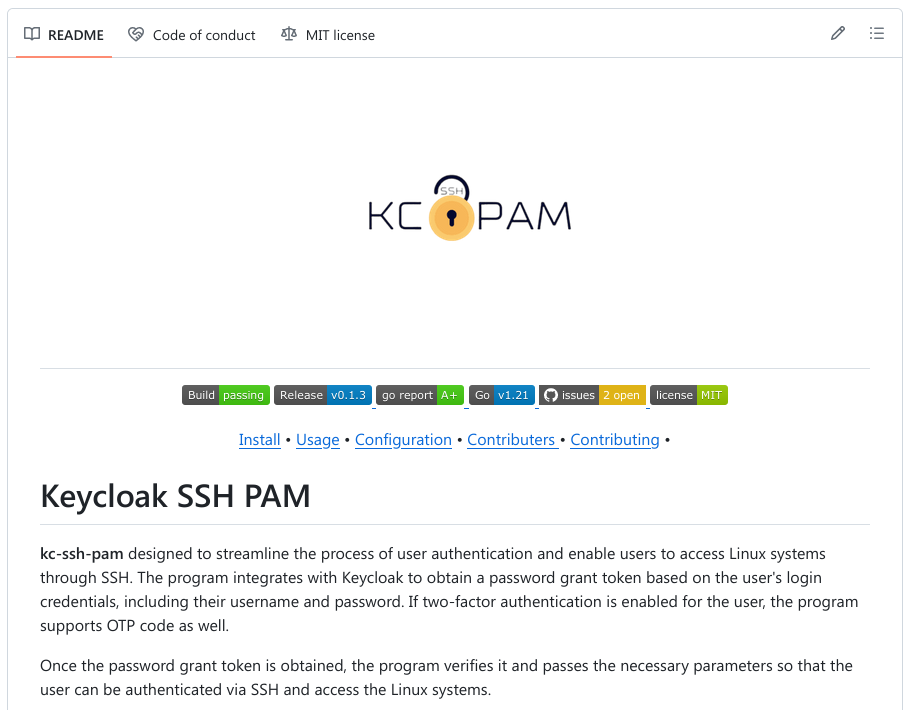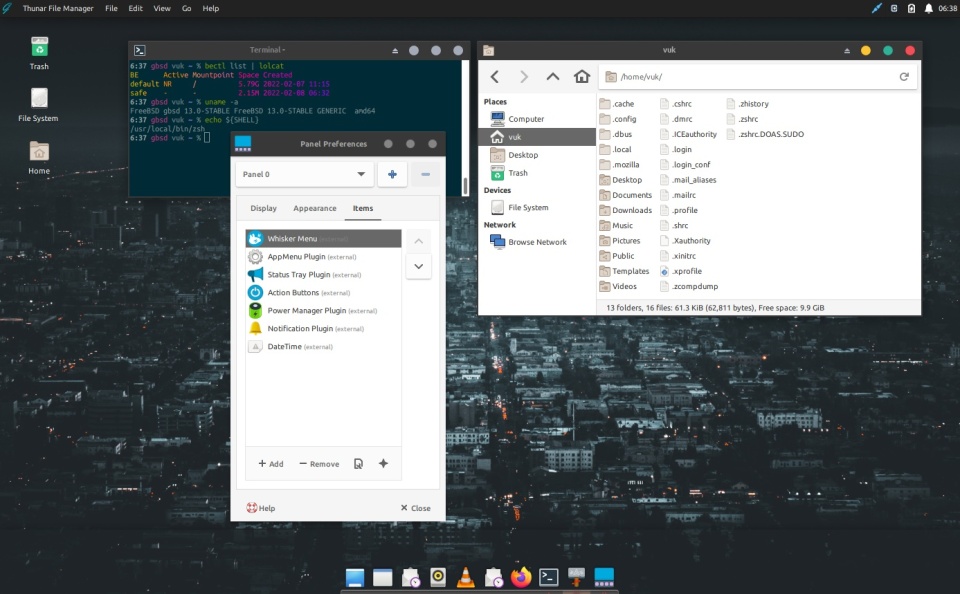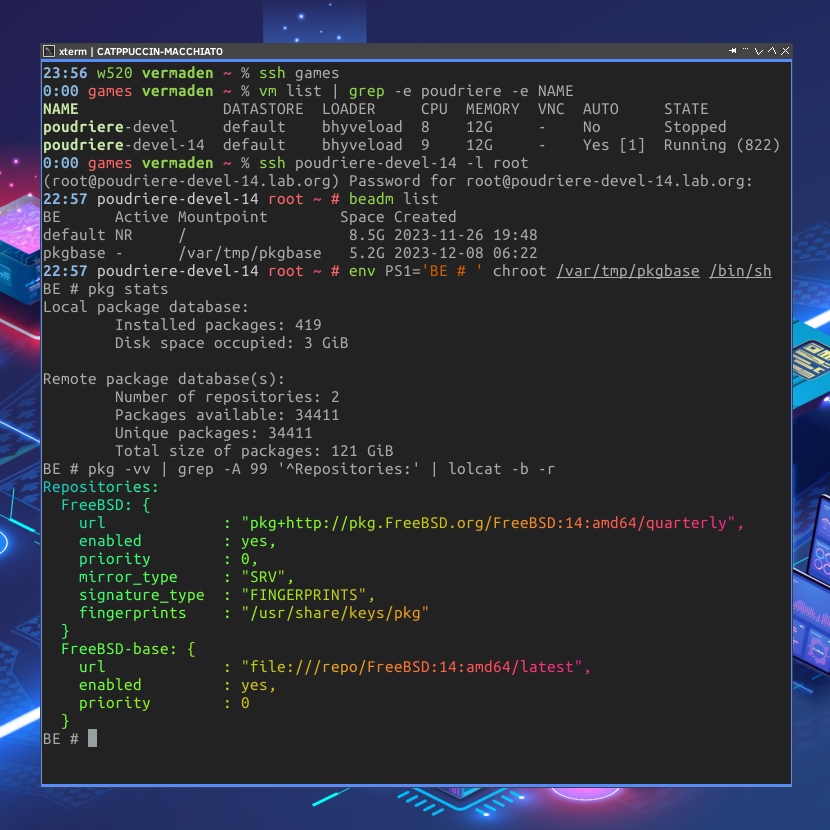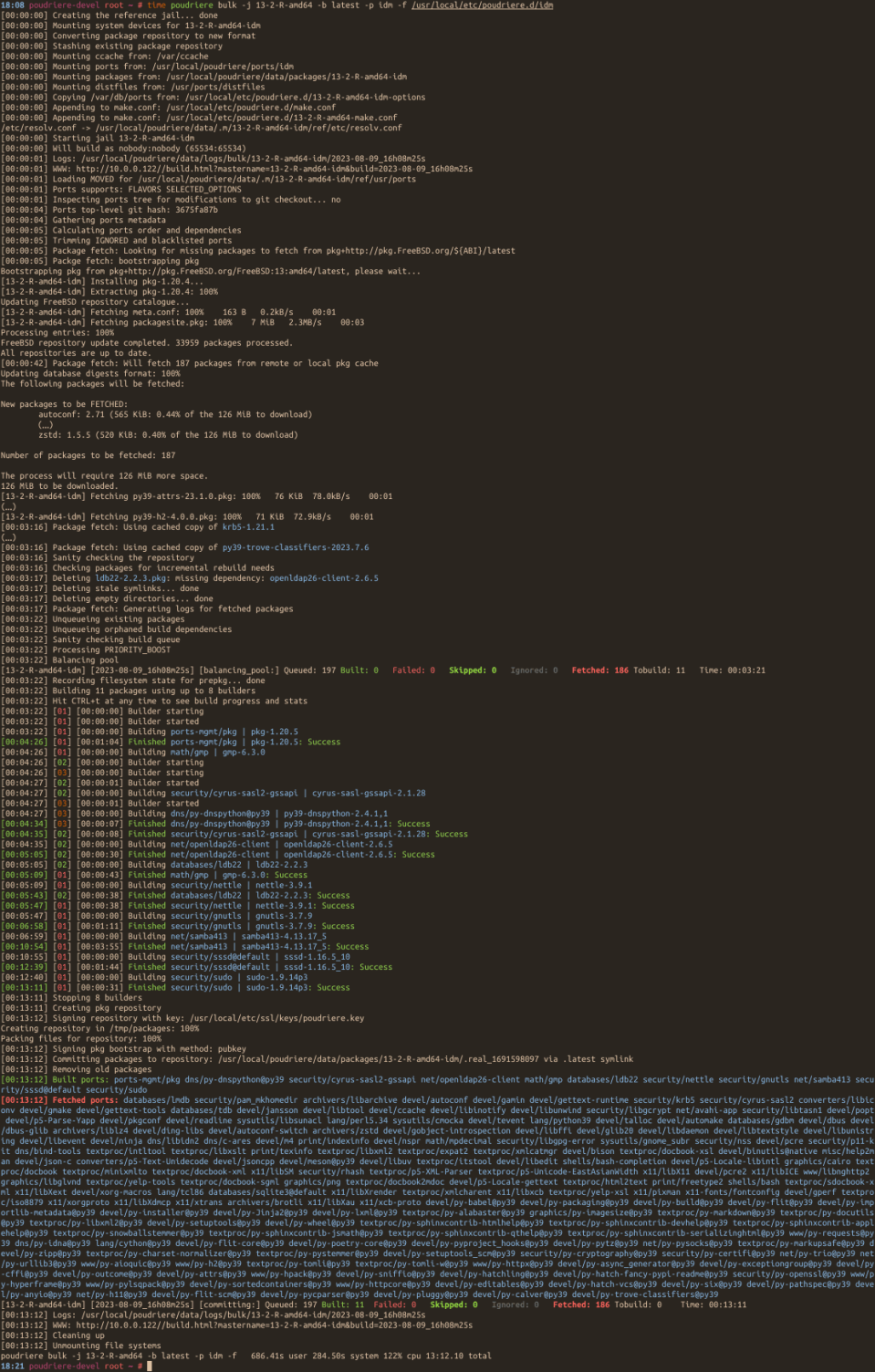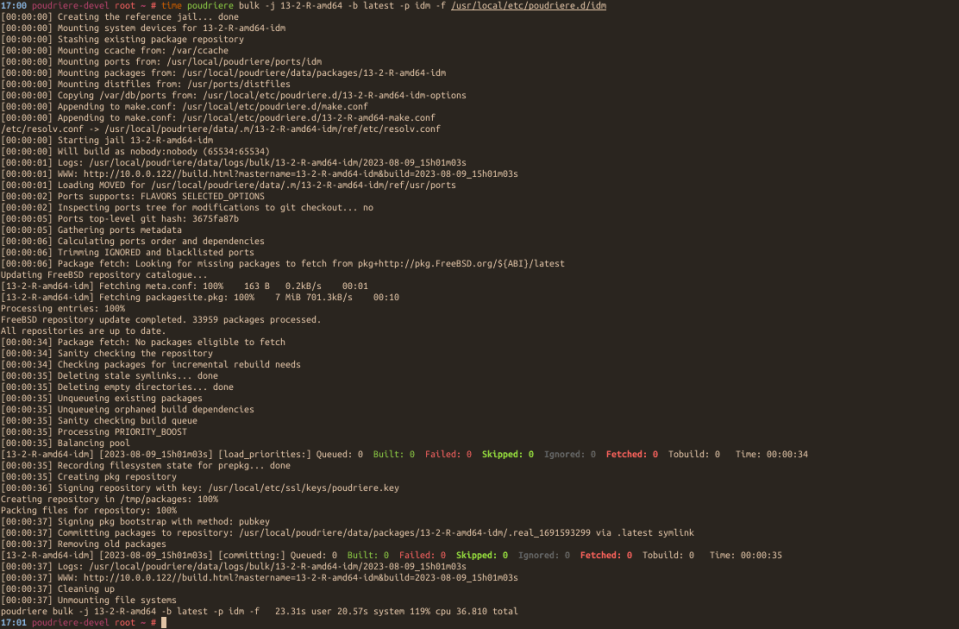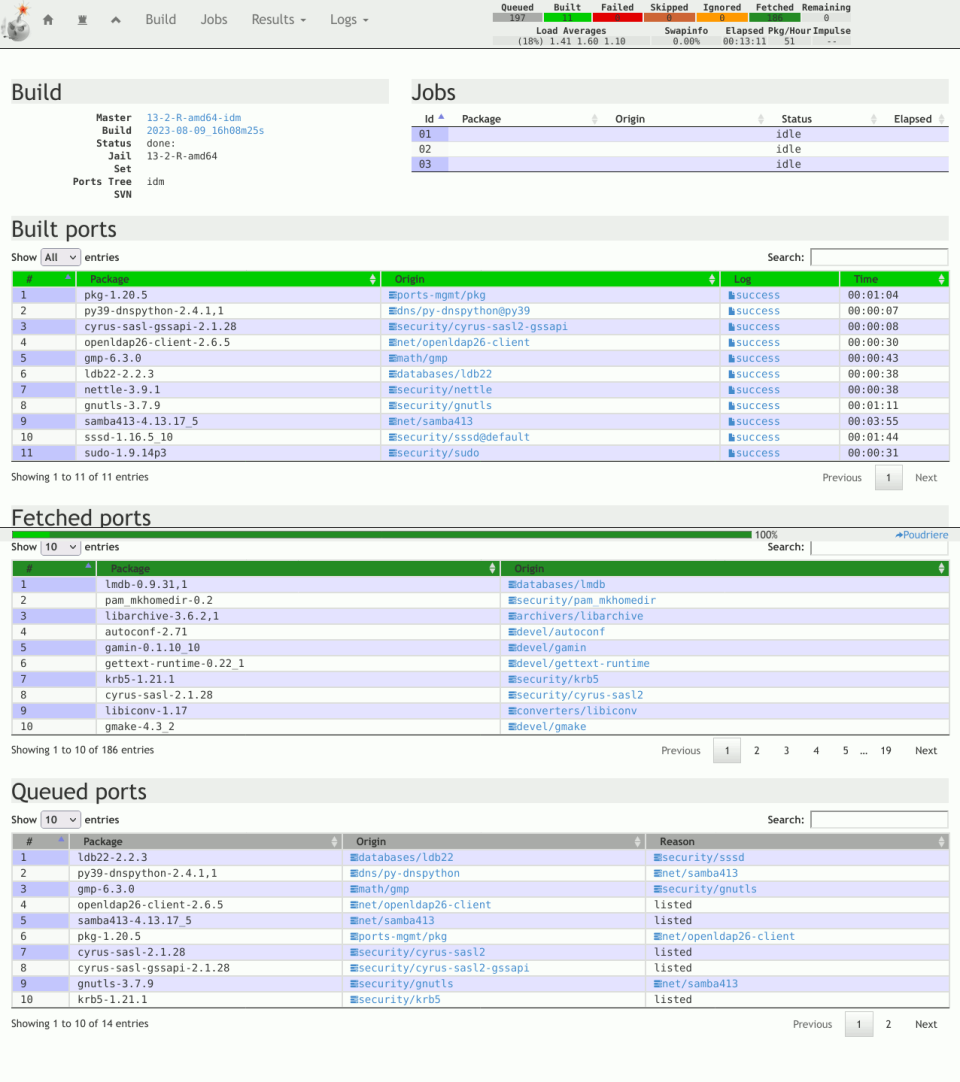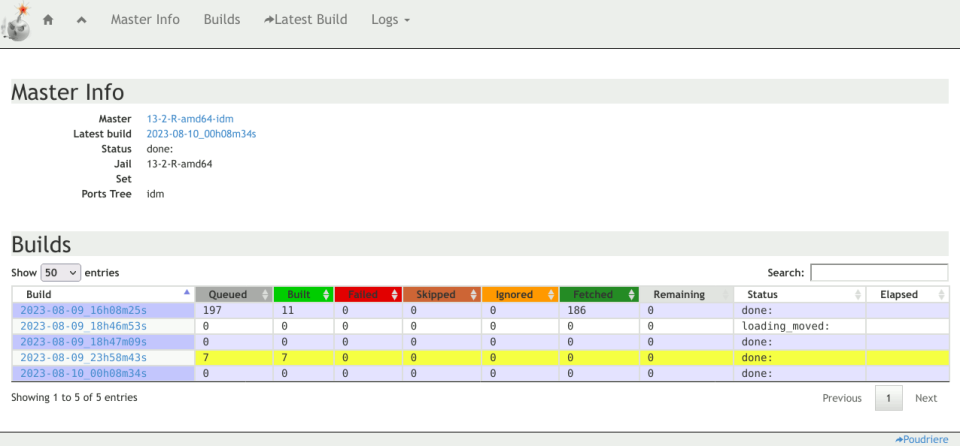In the open source world everything lives/evolves/changes. This is why the new version of connecting latest FreeBSD 14.0-STABLE system to the FreeIPA/IDM is needed. One of the things that changed is that security/sssd is now deprecated and security/sssd2 is its successor. Also new version of ports-mgmt/poudriere-devel is available – with needed fixes already merged – and also with new restyled web interface.

I already messed with that topic several times in the past:
This article will try to address and contain all steps needed – including setting up the FreeIPA/IDM server and including the Poudriere setup. Below You will find Table of Contents for this article. All of these systems will be Bhyve virtual machines.
- FreeIPA/IDM Server – Installation
- FreeIPA/IDM Server – Configuration
- Poudriere Server – Setup
- Poudriere Server – Build FreeIPA/IDM Client Packages
- Poudriere Server – Update Repo/Packages
- FreeBSD 14.0-STABLE Client – Setup
- FreeBSD 14.0-STABLE Client – Debug Commands
- Summary
The FreeBSD project recently started to provide ZFS based VM images … but unfortunately only for 14.0-RELEASE and they are not created for 14.0-STABLE or 15-CURRENT versions – so we will use the UFS based ones for both Poudriere server and FreeBSD FreeIPA/IDM client. For the record – https://download.freebsd.org/snapshots/VM-IMAGES/14.0-STABLE/amd64/Latest/ – they are available here.
Some note about commands run in this article – different colors for various hosts.
host # top -ba -o res 3 // executed on the host system
[root@idm ~]# yum update -y // executed on IDM server
root@freebsd:~ # geom disk list // executed on Poudriere server
root@poudriere-devel-14-stable:~ # poudriere ports -l // executed on Poudriere server
root@idm-client:~ # hostname idm-client.lab.org // executed on IDM client (FreeBSD)
important information // marked as GREEN color
For the FreeIPA/IDM server I have used Alma Linux RHEL clone – but we know that Rocky Linux or Oracle Linux would also work well. We will use three systems in this article.
FreeIPA/IDM server – with idm.lab.org hostname.
OS: Alma Linux
IP: 10.0.0.200/24
GW: 10.0.0.1
domain: lab.org
realm: LAB.ORG
hostname: idm.lab.org
Poudriere builder system – with poudriere-devel-14-stable.lab.org hostname.
OS: FreeBSD 14.0-STABLE
IP: 10.0.0.124/24
GW: 10.0.0.1
DNS: 1.1.1.1
domain: -
realm: -
hostname: poudriere-devel-14-stable.lab.org
FreeBSD client for FreeIPA/IDM system – with idm-client.lab.org hostname.
OS: FreeBSD 14.0-STABLE
IP: 10.0.0.233/24
GW: 10.0.0.1
DNS: 10.0.0.200
domain: lab.org
realm: LAB.ORG
hostname: idm-client.lab.org
I really like the FreeBSD Bhyve memory ballooning – which means the guest VMs only take as much RAM as guest OS allocated and not 12 GB RAM as is configured.
host # vm list | grep -e STATE -e Running
NAME DATASTORE LOADER CPU MEMORY VNC AUTO STATE
idm default uefi 2 4g 0.0.0.0:5900 No Running (25284)
idm-client-14-stable default bhyveload 2 1g - No Running (29517)
poudriere-devel-14-stable default bhyveload 8 12g - Yes [1] Running (23419)
host # top -ba -o res 3
last pid: 1290; load averages: 0.09, 0.09, 0.08 up 0+00:47:08 07:05:20
32 processes: 1 running, 31 sleeping
CPU: 0.0% user, 0.0% nice, 0.6% system, 0.0% interrupt, 99.4% idle
Mem: 2983M Active, 463M Inact, 1060M Wired, 56K Buf, 27G Free
ARC: 619M Total, 115M MFU, 497M MRU, 32K Anon, 2346K Header, 4231K Other
551M Compressed, 1080M Uncompressed, 1.96:1 Ratio
Swap: 4096M Total, 4096M Free
PID USERNAME THR PRI NICE SIZE RES STATE C TIME WCPU COMMAND
25284 root 13 20 0 4159M 1168M kqread 13 3:12 1.27% bhyve: idm (bhyve)
23419 root 19 20 0 12G 109M kqread 15 0:27 0.00% bhyve: poudriere-devel-14-stable (bhyve)
29517 root 13 20 0 1075M 77M kqread 5 0:20 0.00% bhyve: idm-client-14-stable (bhyve)
As you can see I am using sysutils/vm-bhyve-devel for the Bhyve management – but You may as well use bare /usr/share/examples/bhyve/vmrun.sh instead … or even entirely different hypervisor like KVM on Linux or VirtualBox on Windows – it does not matter as long as machines have access to the Internet and they see each other in the same LAN network.
FreeIPA/IDM Server – Installation
I installed the Alma Linux some time ago – so the screenshot shows older 8.7 version.
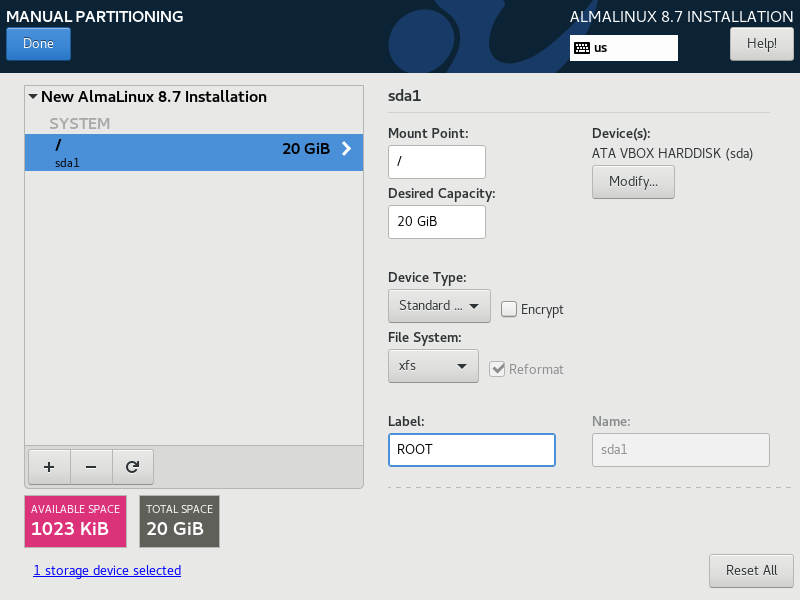
After reboot its network is configured as shown below.
[root@idm ~]# cat /etc/sysconfig/network-scripts/ifcfg-enp0s3
TYPE=Ethernet
PROXY_METHOD=none
BROWSER_ONLY=no
BOOTPROTO=none
DEFROUTE=yes
IPV4_FAILURE_FATAL=no
IPV6INIT=no
IPV6_DEFROUTE=yes
IPV6_FAILURE_FATAL=no
IPV6_ADDR_GEN_MODE=eui64
NAME=enp0s3
UUID=120efe1f-3cb6-40cf-8aad-b17066c08543
DEVICE=enp0s3
ONBOOT=yes
IPADDR=10.0.0.200
PREFIX=24
GATEWAY=10.0.0.1
DNS1=1.1.1.1
IPV6_DISABLED=yes
Some more basic setup commands below.
[root@idm ~]# echo 10.0.0.200 idm.lab.org idm >> /etc/hosts
[root@idm ~]# cat << EOF >> /etc/sysctl.conf
# DISABLE IPv6 FOR MAIN enp0s3 INTERFACE
net.ipv6.conf.enp0s3.disable_ipv6=1
EOF
[root@idm ~]# hostnamectl set-hostname idm.lab.org
[root@idm ~]# timedatectl set-timezone Europe/Warsaw
[root@idm ~]# timedatectl set-local-rtc 0
[root@idm ~]# yum update -y
[root@idm ~]# reboot
Continuation after reboot.
[root@idm ~]# yum module enable idm:DL1 -y
[root@idm ~]# yum distro-sync -y
[root@idm ~]# yum install -y bind-utils chrony nc
[root@idm ~]# ipa-server-install \
--domain lab.org \
--realm LAB.ORG \
--reverse-zone=0.0.10.in-addr.arpa. \
--allow-zone-overlap \
--no-forwarders \
--ntp-pool pool.ntp.org \
--setup-dns \
--ds-password password \
--admin-password password \
--unattended
[root@idm ~]# ipactl status
Directory Service: RUNNING
krb5kdc Service: RUNNING
kadmin Service: RUNNING
named Service: RUNNING
httpd Service: RUNNING
ipa-custodia Service: RUNNING
pki-tomcatd Service: RUNNING
ipa-otpd Service: RUNNING
ipa-dnskeysyncd Service: RUNNING
ipa: INFO: The ipactl command was successful
[root@idm ~]# systemctl list-unit-files | grep ipa | grep service
ipa-ccache-sweep.service static
ipa-custodia.service disabled
ipa-dnskeysyncd.service disabled
ipa-healthcheck.service disabled
ipa-ods-exporter.service disabled
ipa-otpd@.service static
ipa.service enabled
[root@idm ~]# systemctl enable --now httpd
[root@idm ~]# systemctl list-unit-files | grep httpd.service
httpd.service enabled
[root@idm ~]# systemctl disable firewalld
[root@idm ~]# systemctl stop firewalld
[root@idm ~]# cat /etc/sssd/sssd.conf
[domain/lab.org]
ipa_server_mode = True
ipa_server = idm.lab.org
ipa_hostname = idm.lab.org
ipa_domain = lab.org
id_provider = ipa
auth_provider = ipa
chpass_provider = ipa
access_provider = ipa
cache_credentials = True
ldap_tls_cacert = /etc/ipa/ca.crt
krb5_store_password_if_offline = True
[sssd]
services = nss, pam, ifp, ssh, sudo
domains = lab.org
[nss]
homedir_substring = /home
memcache_timeout = 600
[pam]
[sudo]
[autofs]
[ssh]
[pac]
[ifp]
allowed_uids = ipaapi, root
[session_recording]
If you would like to see what a successful ipa-server-install(8) looks like – you can take a look HERE.
We have our FreeIPA/IDM server installed.
You will need to add 10.0.0.200 as idm.lab.org to your /etc/hosts on the system where you will be using the browser (or to your local DNS).
host # grep idm /etc/hosts
10.0.0.200 idm.lab.org idm
You can login to it typing https://10.0.0.200 at your local browser – you will be redirected to https://idm.lab.org/ipa/ui/ immediately and you will see the login page as shown below.
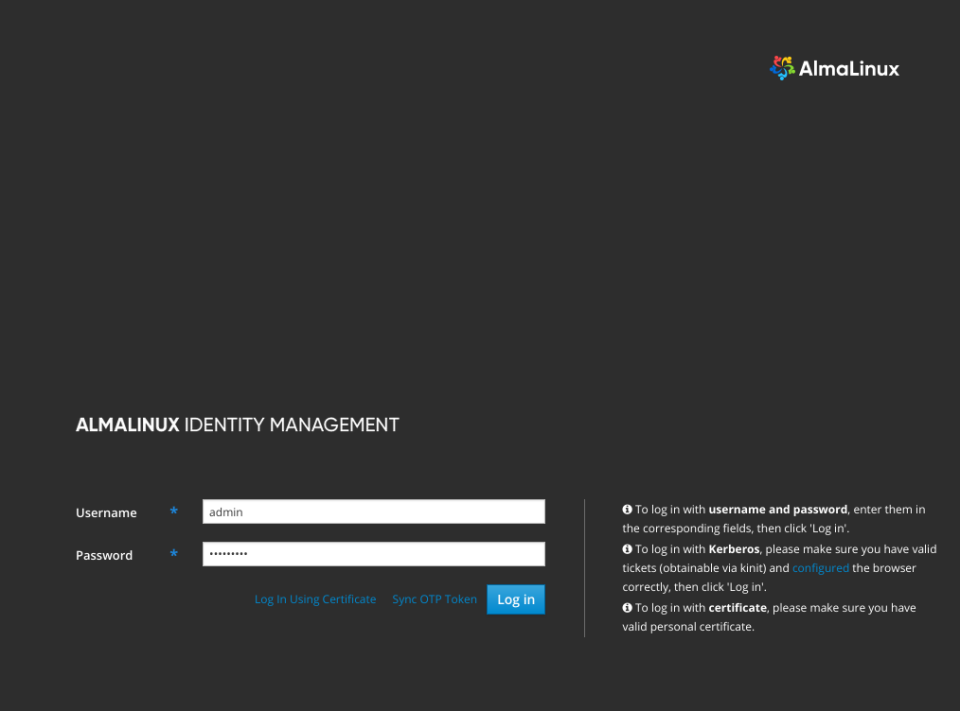
You may login with admin username and the password you specified for the ipa-server-install(8) command (or password if you just copy pasted that command 🙂
FreeIPA/IDM Server – Configuration
… and after logging in I created a regular vermaden user as shown below.

Keep in mind to reset your password by connecting to FreeIPA/IDM server.
host # ssh -l vermaden 10.0.0.200
(vermaden@10.0.0.200) Password:
(vermaden@10.0.0.200) Password expired. Change your password now.
Current Password:
(vermaden@10.0.0.200) New password:
(vermaden@10.0.0.200) Retype new password:
Last failed login: Wed Oct 19 00:47:57 CEST 2022 from 10.0.0.33 on ssh:notty
There was 1 failed login attempt since the last successful login.
[vermaden@idm /]$ w
12:58:50 up 6:39, 1 user, load average: 0.02, 0.05, 0.00
USER TTY FROM LOGIN@ IDLE JCPU PCPU WHAT
vermaden pts/0 10.0.0.4 12:58 1.00s 0.04s 0.01s w
The more important configuration is in HBAC and Sudo rules.
Here are HBAC related settings.
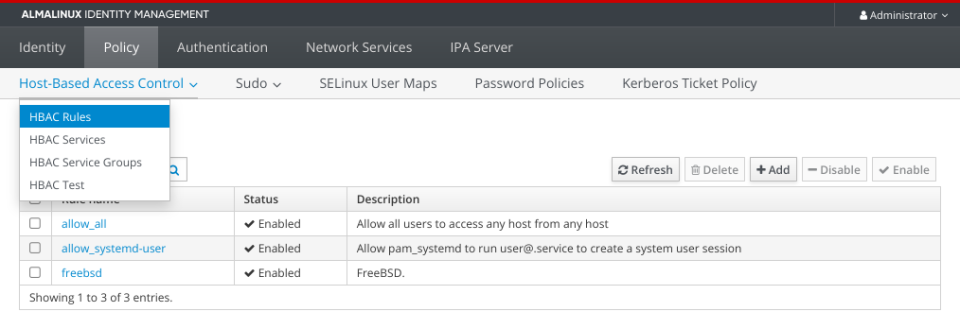
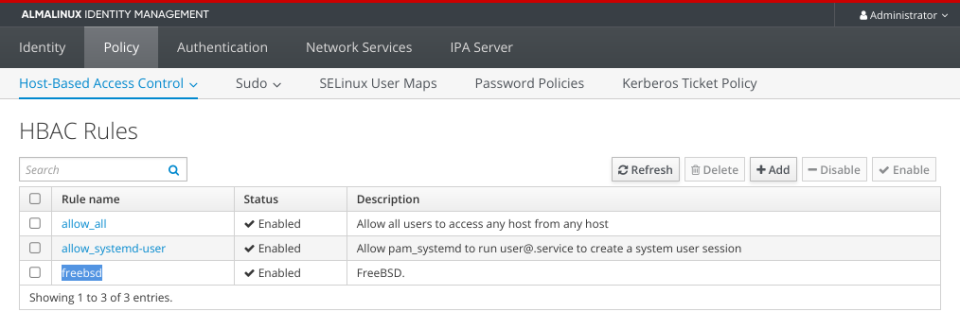
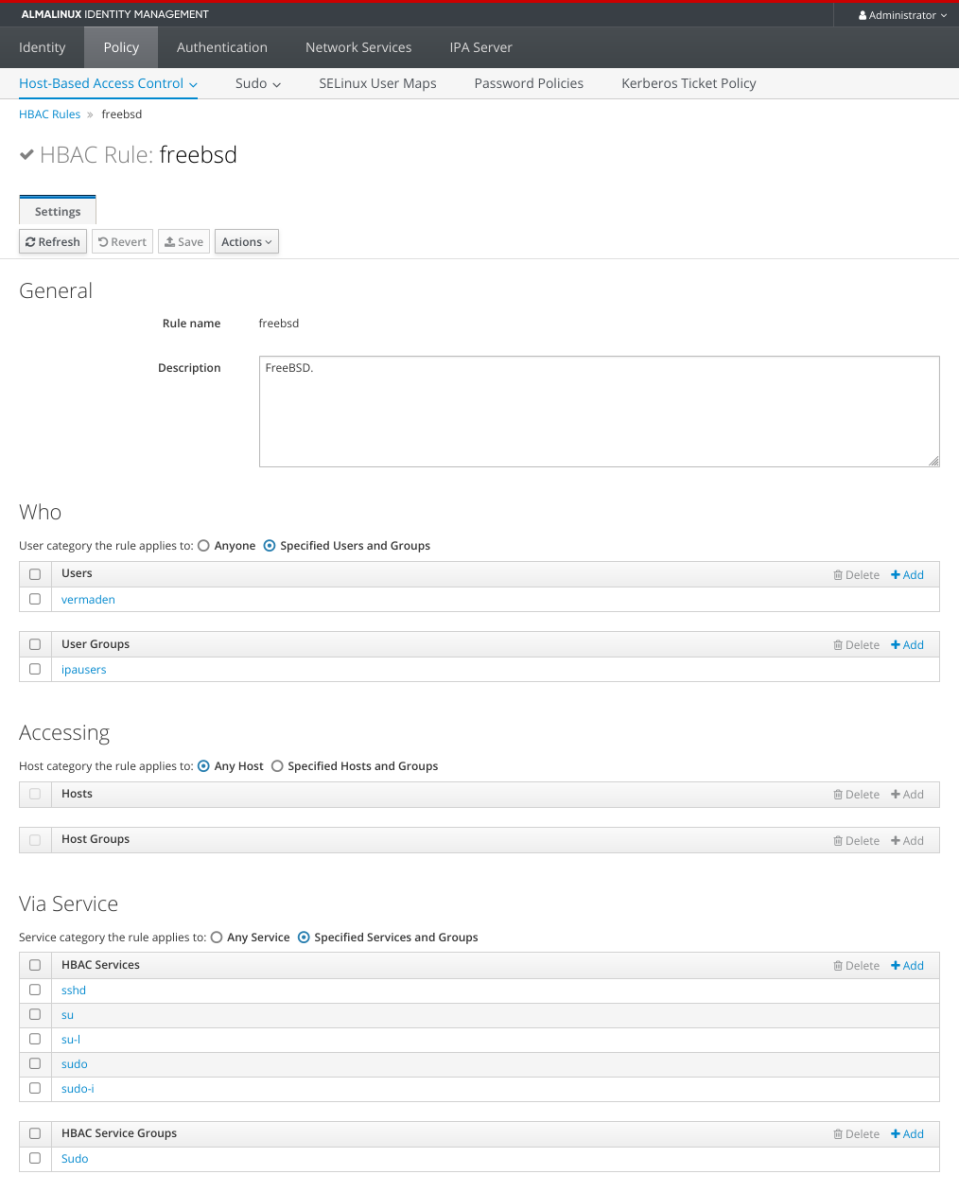
… and the Sudo part.


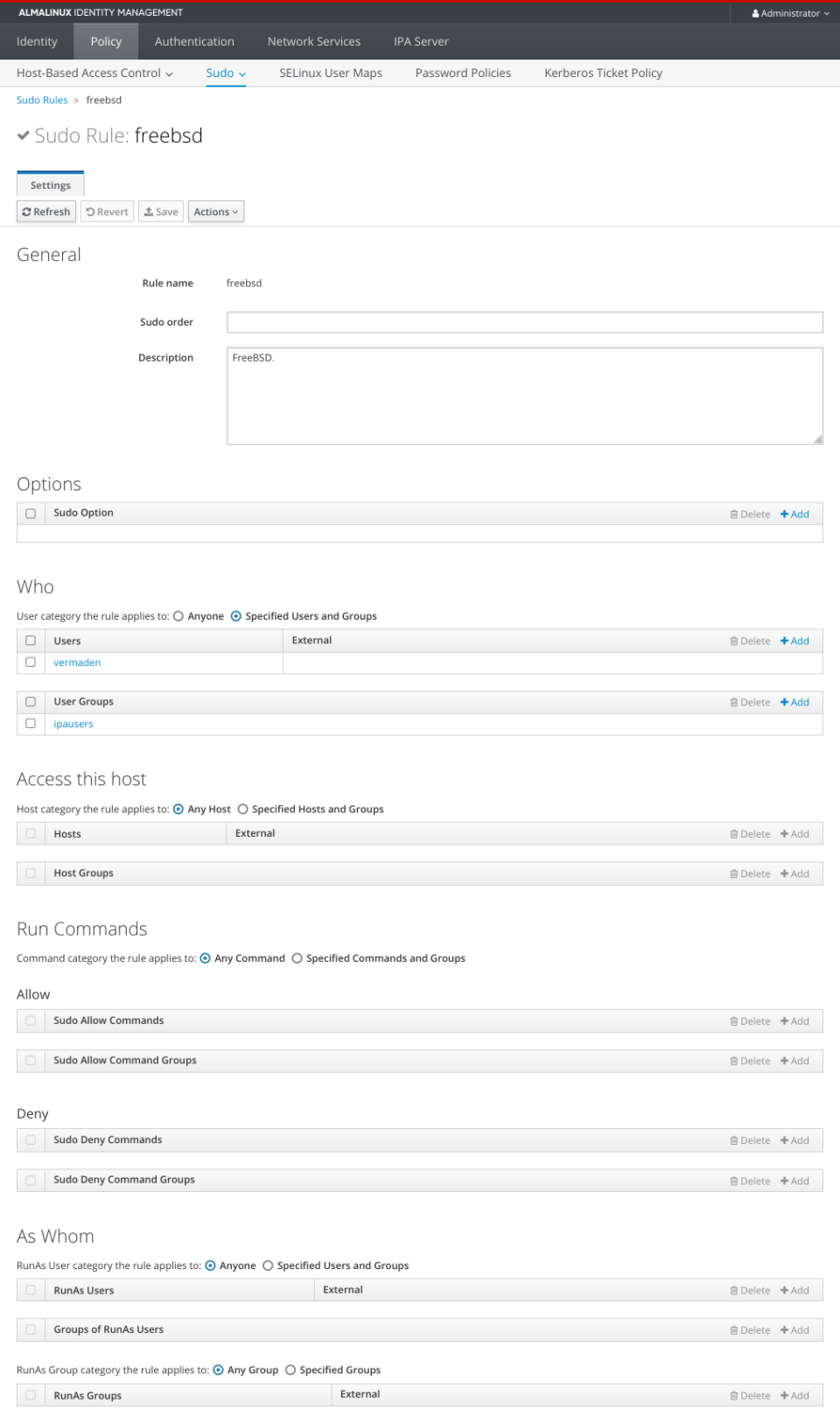
Poudriere Server – Setup
One note for the FreeBSD setups below – please use /bin/sh shell (default for root since 14.0-RELEASE) for the commands … or zsh(1) for example … or other POSIX compatible shell. Some of these commands may not work properly on ‘C’ based shells or in fish(1) shell.
This is the template I used for Bhyve VMs.
host # cat /vm/.templates/freebsd.conf
loader="bhyveload"
cpu=1
memory=256M
network0_type="virtio-net"
network0_switch="public"
disk0_type="nvme"
disk0_name="disk0.img"
We will now create poudriere-devel-14-stable VM for Poudriere server.
host # vm create -t freebsd -s 20g -m 12g -c 8 poudriere-devel-14-stable
host # du -sgA /vm/poudriere-devel-14-stable/*
20 /vm/poudriere-devel-14-stable/disk0.img
1 /vm/poudriere-devel-14-stable/poudriere-devel-14-stable.conf
1 /vm/poudriere-devel-14-stable/vm-bhyve.log
Now we will replace disk0.img with Latest FreeBSD 14.0-STABLE snapshot.
host # fetch -o - 'https://download.freebsd.org/snapshots/VM-IMAGES/14.0-STABLE/amd64/Latest/FreeBSD-14.0-STABLE-amd64.raw.xz' \
| xz -d > /vm/poudriere-devel-14-stable/disk0.img
host # file -b /vm/poudriere-devel-14-stable/disk0.img
DOS/MBR boot sector; partition 1 : ID=0xee, start-CHS (0x0,0,2), end-CHS (0x3ff,255,63), startsector 1, 12649684 sectors
host # du -sgA /vm/poudriere-devel-14-stable/*
7 /vm/poudriere-devel-14-stable/disk0.img
1 /vm/poudriere-devel-14-stable/poudriere-devel-14-stable.conf
1 /vm/poudriere-devel-14-stable/vm-bhyve.log
We now need to add additional disk1.img disk to for ZFS pool.
host # truncate -s 10G /vm/poudriere-devel-14-stable/disk0.img
host # vm add -d disk -t file -s 100g poudriere-devel-14-stable
host # vm info poudriere-devel-14-stable | grep -A 16 virtual-disk
virtual-disk
number: 0
device-type: file
emulation: nvme
options: -
system-path: /vm/poudriere-devel-14-stable/disk0.img
bytes-size: 10737418240 (10.000G)
bytes-used: 1720046592 (1.601G)
virtual-disk
number: 1
device-type: file
emulation: nvme
options: -
system-path: /vm/poudriere-devel-14-stable/disk1.img
bytes-size: 107374182400 (100.000G)
bytes-used: 1024 (1.000K)
host # du -sgA /vm/poudriere-devel-14-stable/*
10 /vm/poudriere-devel-14-stable/disk0.img
100 /vm/poudriere-devel-14-stable/disk1.img
1 /vm/poudriere-devel-14-stable/poudriere-devel-14-stable.conf
1 /vm/poudriere-devel-14-stable/vm-bhyve.log
Now internally inside VM.
host # vm start poudriere-devel-14-stable
Starting poudriere-devel-14-stable
* found guest in /vm/poudriere-devel-14-stable
* booting...
host # vm console poudriere-devel-14-stable
(...)
Starting devd.
Starting dhclient.
DHCPDISCOVER on vtnet0 to 255.255.255.255 port 67 interval 4
DHCPOFFER from 10.0.0.1
DHCPREQUEST on vtnet0 to 255.255.255.255 port 67
DHCPACK from 10.0.0.1
bound to 10.0.0.23 -- renewal in 43200 seconds.
add host 127.0.0.1: gateway lo0 fib 0: route already in table
add host ::1: gateway lo0 fib 0: route already in table
add net fe80::: gateway ::1
add net ff02::: gateway ::1
add net ::ffff:0.0.0.0: gateway ::1
add net ::0.0.0.0: gateway ::1
Updating motd:.
Updating /var/run/os-release done.
Clearing /tmp (X related).
Creating and/or trimming log files.
Starting syslogd.
Mounting late filesystems:.
Starting cron.
Starting background file system checks in 60 seconds.
Wed Mar 6 08:23:03 UTC 2024
FreeBSD/amd64 (freebsd) (ttyu0)
login:
Use the root user with ’empty’ password – just hit [ENTER] key on password prompt.
root@freebsd:~ # :> ~/.hushlogin
root@freebsd:~ # passwd root
Changing local password for root
New Password:
Retype New Password:
root@freebsd:~ # geom disk list
Geom name: nda0
Providers:
1. Name: nda0
Mediasize: 10737418240 (10G)
Sectorsize: 512
Mode: r3w3e8
descr: bhyve-NVMe
lunid: 589cfc2012350001
ident: NVME-4-0
rotationrate: 0
fwsectors: 0
fwheads: 0
Geom name: nda1
Providers:
1. Name: nda1
Mediasize: 107374182400 (100G)
Sectorsize: 512
Mode: r0w0e0
descr: bhyve-NVMe
lunid: 589cfc20d2f40001
ident: NVME-4-1
rotationrate: 0
fwsectors: 0
fwheads: 0
root@freebsd:~ # zpool create zroot nda1
ZFS filesystem version: 5
ZFS storage pool version: features support (5000)
root@freebsd:~ # zfs set mountpoint=none zroot
root@freebsd:~ # zfs list
NAME USED AVAIL REFER MOUNTPOINT
zroot 100K 96.4G 24K none
Now some basic configuration.
root@freebsd:~ # cat /etc/rc.conf
hostname="poudriere-devel-14-stable.lab.org"
ifconfig_DEFAULT="inet 10.0.0.124/24 up"
defaultrouter="10.0.0.1"
zfs_enable="YES"
sshd_enable="YES"
nginx_enable="YES"
root@freebsd:~ # cat /etc/hosts
::1 localhost localhost.my.domain
127.0.0.1 localhost localhost.my.domain
10.0.0.124 poudriere-devel-14-stable.lab.org poudriere-devel-14-stable
root@freebsd:~ # service sshd start
root@freebsd:~ # mkdir -p /usr/local/etc/pkg/repos
root@freebsd:~ # sed -e s/quarterly/latest/g /etc/pkg/FreeBSD.conf \
> /usr/local/etc/pkg/repos/FreeBSD.conf
root@freebsd:~ # pkg install -y \
beadm \
lsblk \
poudriere-devel \
nginx \
git-lite \
ccache4 \
tree \
screen
root@freebsd:~ # reboot
Fortunately we do not need to patch ports-mgmt/poudriere-devel anymore as the -u flag for sort(1) is already there.
root@poudriere-devel-14-stable:~ # grep remote_all_ /usr/local/share/poudriere/common.sh | grep sort
"${remote_all_options}" | sort -k1.2 -u | paste -s -d ' ' -)
"${remote_all_dept}" | sort -u | paste -s -d ' ' -)
We will now setup actual Poudriere server.
root@poudriere-devel-14-stable:~ # export SSL=/usr/local/etc/ssl
root@poudriere-devel-14-stable:~ # mkdir -p \
/usr/ports/distfiles \
${SSL}/keys \
${SSL}/certs
root@poudriere-devel-14-stable:~ # chmod 0600 ${SSL}/keys
root@poudriere-devel-14-stable:~ # openssl genrsa -out ${SSL}/keys/poudriere.key 4096
root@poudriere-devel-14-stable:~ # openssl rsa \
-in ${SSL}/keys/poudriere.key -pubout \
-out ${SSL}/certs/poudriere.cert
root@poudriere-devel-14-stable:~ # zfs create -p -o mountpoint=/var/ccache zroot/var/ccache
root@poudriere-devel-14-stable:~ # zfs list
NAME USED AVAIL REFER MOUNTPOINT
zroot 213K 96.4G 24K none
zroot/var 48K 96.4G 24K none
zroot/var/ccache 24K 96.4G 24K /var/ccache
root@poudriere-devel-14-stable:~ # export IP=10.0.0.124
root@poudriere-devel-14-stable:~ # cat << EOF > /usr/local/etc/poudriere.conf
ZPOOL=zroot
BASEFS=/usr/local/poudriere
ZROOTFS=/usr/local/poudriere
FREEBSD_HOST=ftp://ftp.freebsd.org
POUDRIERE_DATA=/usr/local/poudriere/data
CHECK_CHANGED_OPTIONS=verbose
CHECK_CHANGED_DEPS=yes
PKG_REPO_SIGNING_KEY=/usr/local/etc/ssl/keys/poudriere.key
URL_BASE=http://${IP}/
USE_TMPFS=no
TMPFS_LIMIT=12
MAX_MEMORY=12
PARALLEL_JOBS=8
PREPARE_PARALLEL_JOBS=8
MAX_FILES=4096
DISTFILES_CACHE=/usr/ports/distfiles
KEEP_OLD_PACKAGES=yes
KEEP_OLD_PACKAGES_COUNT=3
CHECK_CHANGED_OPTIONS=verbose
CHECK_CHANGED_DEPS=yes
CCACHE_DIR=/var/ccache
RESTRICT_NETWORKING=no
EOF
root@poudriere-devel-14-stable:~ # mkdir -p /usr/local/poudriere/data/logs/bulk
root@poudriere-devel-14-stable:~ # ln -s \
/usr/local/etc/ssl/certs/poudriere.cert \
/usr/local/poudriere/data/logs/bulk/poudriere.cert
root@poudriere-devel-14-stable:~ # service nginx enable
root@poudriere-devel-14-stable:~ # sed -i '' -E 's|text/plain[\t\ ]*txt|text/plain txt log|g' /usr/local/etc/nginx/mime.types
root@poudriere-devel-14-stable:~ # export IP=10.0.0.124
root@poudriere-devel-14-stable:~ # cat << EOF > /usr/local/etc/nginx/nginx.conf
events {
worker_connections 1024;
}
http {
include mime.types;
default_type application/octet-stream;
server {
listen 80 default;
server_name ${IP};
root /usr/local/share/poudriere/html;
location /data {
alias /usr/local/poudriere/data/logs/bulk;
autoindex on;
}
location /packages {
root /usr/local/poudriere/data;
autoindex on;
}
}
}
EOF
root@poudriere-devel-14-stable:~ # service nginx restart
root@poudriere-devel-14-stable:~ # mkdir -p /root/.cache/ccache
root@poudriere-devel-14-stable:~ # ln -sf /var/ccache /root/.cache/ccache
root@poudriere-devel-14-stable:~ # cat << EOF > /usr/local/etc/poudriere.d/make.conf
ALLOW_UNSUPPORTED_SYSTEM=yes
DISABLE_LICENSES=yes
EOF
root@poudriere-devel-14-stable:~ # cat << EOF > /var/ccache/ccache.conf
max_size = 0
cache_dir = /var/ccache
base_dir = /var/ccache
hash_dir = false
EOF
root@poudriere-devel-14-stable:~ # poudriere jail -c -j 14-0-S-amd64 -v 14.0-STABLE
(...)
[00:20:45] Jail 14-0-S-amd64 14.0-STABLE amd64 is ready to be used
root@poudriere-devel-14-stable:~ # poudriere jail -l
JAILNAME VERSION ARCH METHOD TIMESTAMP PATH
14-0-S-amd64 14.0-STABLE amd64 http 2024-03-06 09:44:27 /usr/local/poudriere/jails/14-0-S-amd64
root@poudriere-devel-14-stable:~ # poudriere ports -c -p idm
[00:00:00] Creating idm fs at /usr/local/poudriere/ports/idm... done
[00:00:00] Cloning the ports tree... done
root@poudriere-devel-14-stable:~ # poudriere ports -l
PORTSTREE METHOD TIMESTAMP PATH
idm git+https 2024-03-06 10:10:53 /usr/local/poudriere/ports/idm
Poudriere Server – Build FreeIPA/IDM Client Packages
Now we will choose needed options for our FreeBSD Ports and then start the bulk process of fetching and building them.
root@poudriere-devel-14-stable:~ # poudriere options -c -n -p idm security/cyrus-sasl2-gssapi
// SELECT: (*) GSSAPI_MIT
root@poudriere-devel-14-stable:~ # poudriere options -c -n -p idm net/openldap26-client
// SELECT: [x] GSSAPI
root@poudriere-devel-14-stable:~ # poudriere options -c -n -p idm security/sudo
// DESELECT: [ ] PAM
// SELECT: (*) GSSAPI_MIT
// SELECT: (*) SSSD2
root@poudriere-devel-14-stable:~ # cat << EOF > /usr/local/etc/poudriere.d/idm
security/krb5
security/sudo
security/sssd2
security/cyrus-sasl2
security/cyrus-sasl2-gssapi
security/pam_mkhomedir
net/openldap26-client
net/samba416
EOF
root@poudriere-devel-14-stable:~ # poudriere bulk -j 14-0-S-amd64 -b latest -p idm -f /usr/local/etc/poudriere.d/idm
root@poudriere-devel-14-stable:~ # zfs list
NAME USED AVAIL REFER MOUNTPOINT
zroot 1.51G 94.9G 24K none
zroot/usr 1.39G 94.9G 24K none
zroot/usr/local 1.39G 94.9G 24K none
zroot/usr/local/poudriere 1.39G 94.9G 24K none
zroot/usr/local/poudriere/jails 1.07G 94.9G 24K none
zroot/usr/local/poudriere/jails/14-0-S-amd64 1.07G 94.9G 1.07G /usr/local/poudriere/jails/14-0-S-amd64
zroot/usr/local/poudriere/ports 328M 94.9G 24K none
zroot/usr/local/poudriere/ports/idm 328M 94.9G 328M /usr/local/poudriere/ports/idm
zroot/var 117M 94.9G 24K none
zroot/var/ccache 117M 94.9G 117M /var/ccache
This is how the Poudriere build process looks like from the terminal … and a view for its new ZFS datasets that Poudriere created.
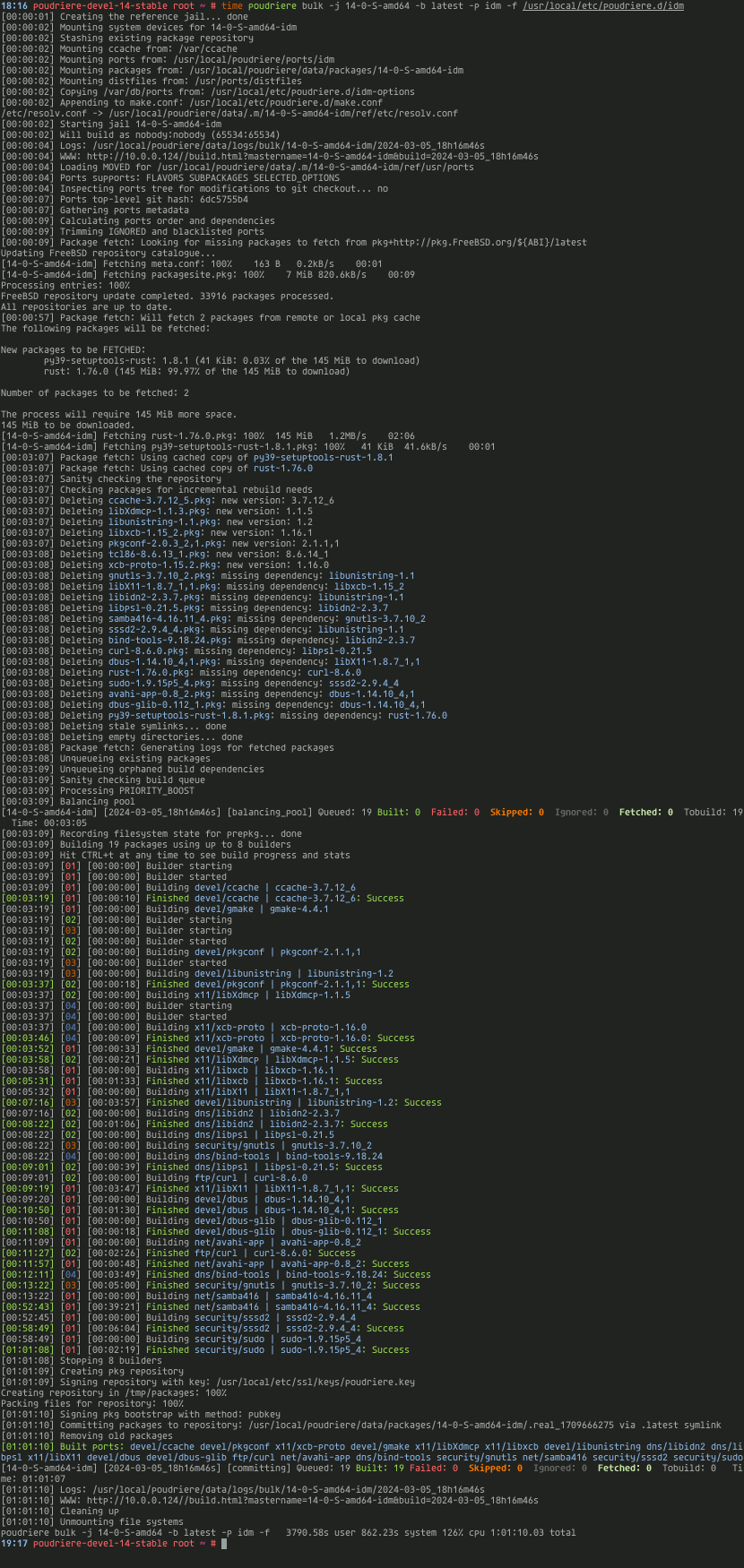
It was 2nd or 3rd run so when You first will run the bulk there will be more information about fetching packages etc.
Below You can see what processes are running in htop(1) during the build.
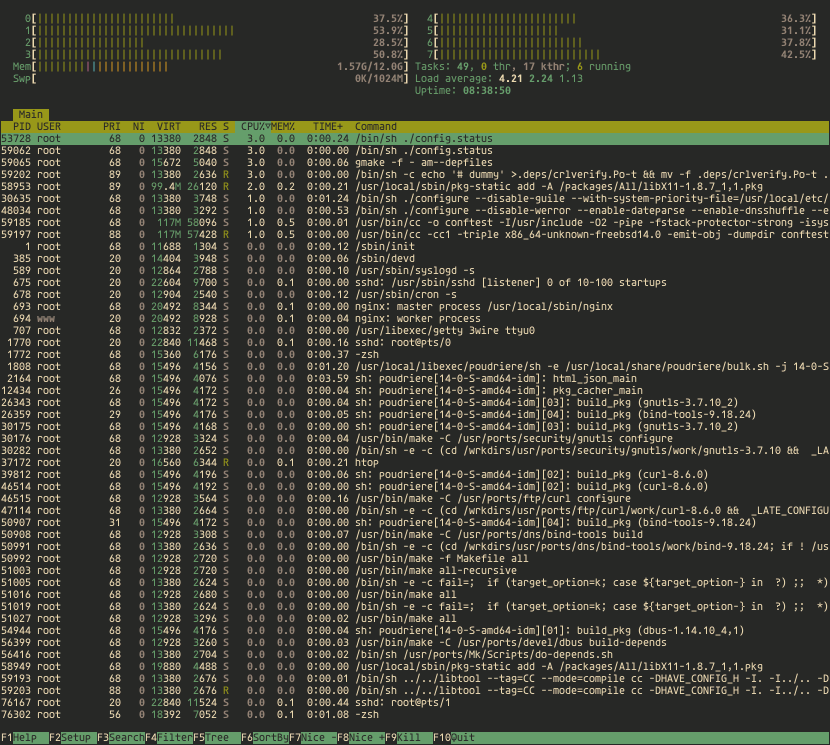
You can also follow the status of the build process in the browser at https://10.0.0.124 page.
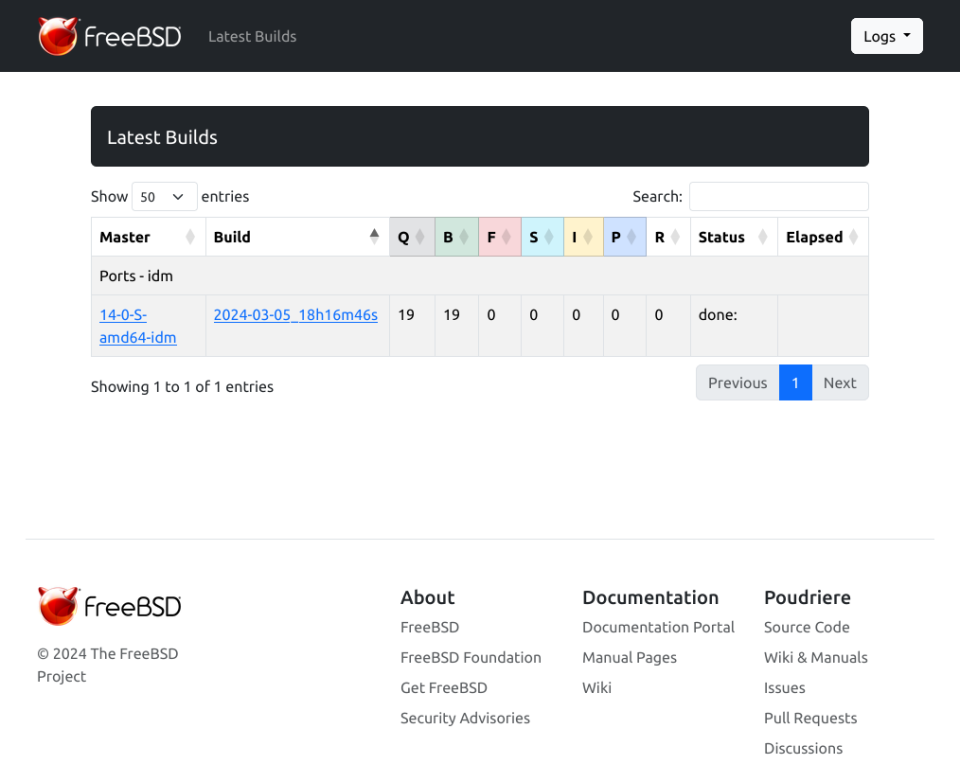
Generally the new Poudriere interface is quite ‘large’ I would say – so I use it at 70% scale/zoom on Firefox and IMHO its more usable like that.
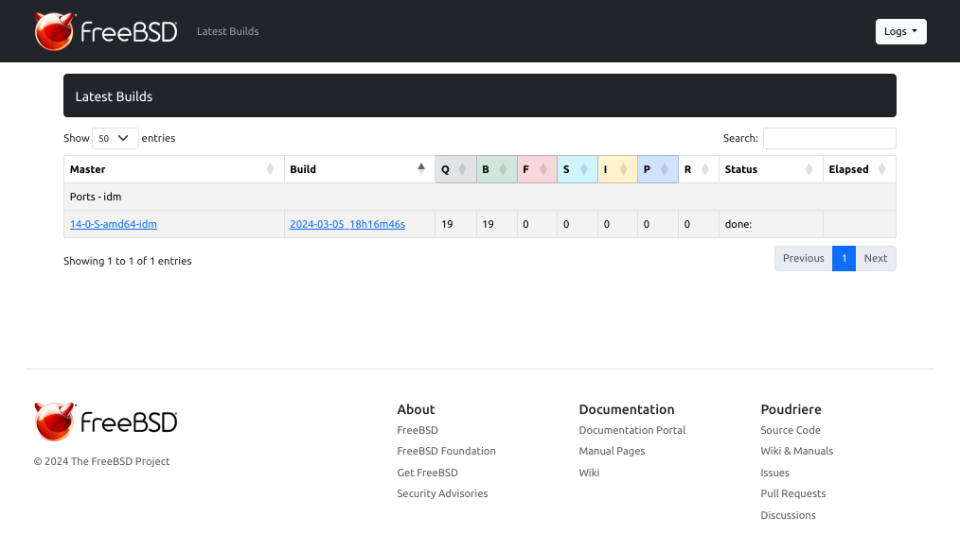
And below are the details about our build job.
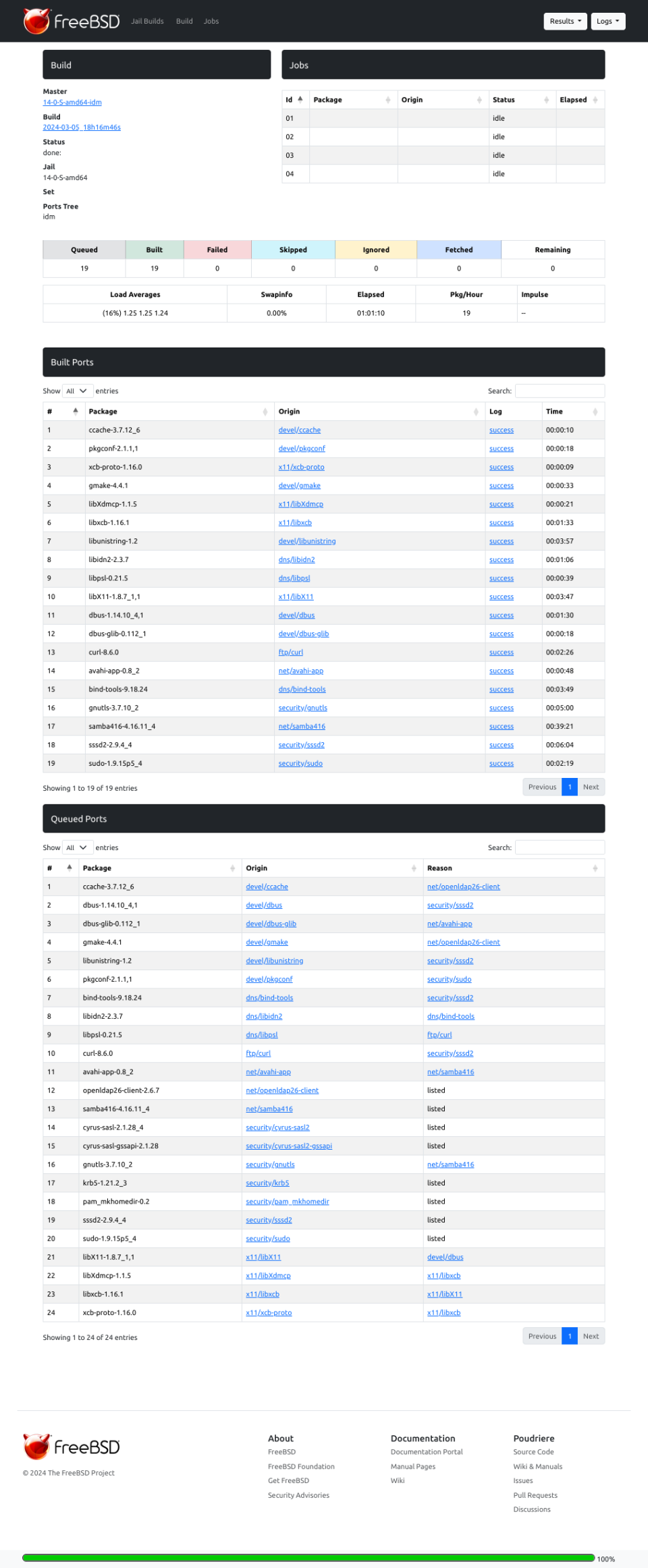
Poudriere Server – Update Repo/Packages
Everytime you will need to update the packages in that FreeIPA/IDM repo You will need to run these commands.
root@poudriere-devel-14-stable:~ # poudriere ports -u -p idm
root@poudriere-devel-14-stable:~ # poudriere bulk -j 14-0-S-amd64 -b latest -p idm -f /usr/local/etc/poudriere.d/idm
You may as well update the FreeBSD Jail when needed.
root@poudriere-devel-14-stable:~ # poudriere jail -u -j 14-0-S-amd64
FreeBSD 14.0-STABLE Client – Setup
I will not repeat the process – but the same as with Poudriere server – you need to create FreeBSD client – for example as Bhyve VM.
Now – the needed configuration on FreeBSD 14.0-STABLE system to connect it to FreeIPA/IDM server.
root@idm-client:~ # :> ~/.hushlogin
root@idm-client:~ # mkdir -p \
/usr/local/etc/ipa \
/var/log/sssd \
/var/run/sss/private \
/var/db/sss
root@idm-client:~ # echo '10.0.0.233 idm-client.lab.org idm-client' >> /etc/hosts
root@idm-client:~ # echo '10.0.0.200 idm.lab.org idm' >> /etc/hosts
root@idm-client:~ # hostname idm-client.lab.org
root@idm-client:~ # sysrc hostname=idm-client.lab.org
root@idm-client:~ # fetch -o /usr/local/etc/ipa/ca.crt http://idm.lab.org/ipa/config/ca.crt
Now we will need to add or FreeBSD client to FreeIPA/IDM. Instructions below.
[root@idm ~]# kinit admin
[root@idm ~]# ipa dnsrecord-add lab.org idm-client --a-rec=10.0.0.233 --a-create-reverse
Record name: idm-client
A record: 10.0.0.233
[root@idm ~]# ipa host-add idm-client.lab.org
-------------------------------
Added host "idm-client.lab.org"
-------------------------------
Host name: idm-client.lab.org
Principal name: host/idm-client.lab.org@LAB.ORG
Principal alias: host/idm-client.lab.org@LAB.ORG
Password: False
Keytab: False
Managed by: idm-client.lab.org
[root@idm ~]# ipa-getkeytab -s idm.lab.org -p host/idm-client.lab.org@LAB.ORG -k /root/idm-client.lab.org.keytab
Keytab successfully retrieved and stored in: /root/idm-client.lab.org.keytab
[root@idm ~]# cp /root/idm-client.lab.org.keytab /usr/share/ipa/html/
[root@idm ~]# chmod 644 /usr/share/ipa/html/idm-client.lab.org.keytab
Now lets get back to our FreeBSD client.
root@idm-client:~ # fetch -o /usr/local/etc/ipa/krb5.keytab \
http://idm.lab.org/ipa/config/idm-client.lab.org.keytab
root@idm-client:~ # chmod 600 /usr/local/etc/ipa/krb5.keytab
root@idm-client:~ # mkdir -p /usr/local/etc/ssl/certs
root@idm-client:~ # mkdir -p /usr/local/etc/pkg/repos
root@idm-client:~ # sed -e 's|quarterly|latest|g' /etc/pkg/FreeBSD.conf \
> /usr/local/etc/pkg/repos/FreeBSD.conf
root@idm-client:~ # pkg install -y beadm
root@idm-client:~ # fetch -o /usr/local/etc/ssl/certs/poudriere.cert \
http://poudriere-devel-14-stable.lab.org/data/poudriere.cert
root@idm-client:~ # export IP=10.0.0.124
root@idm-client:~ # cat << EOF > /usr/local/etc/pkg/repos/14-0-S-amd64.conf
14-0-S-amd64-idm: {
url: "http://${IP}/packages/14-0-S-amd64-idm/",
mirror_type: "http",
signature_type: "pubkey",
pubkey: "/usr/local/etc/ssl/certs/poudriere.cert",
enabled: yes,
priority: 100
}
EOF
root@idm-client:~ # pkg update -f
root@idm-client:~ # pkg install -y \
krb5 \
sudo \
sssd2 \
cyrus-sasl \
cyrus-sasl-gssapi \
openldap26-client \
pam_mkhomedir
root@idm-client:~ # cat << EOF >> /etc/ssh/ssh_config
GSSAPIAuthentication yes
EOF
root@idm-client:~ # cat << EOF >> /etc/ssh/sshd_config
GSSAPIAuthentication yes
UsePAM yes
EOF
root@idm-client:~ # cat << EOF > /usr/local/etc/sssd/sssd.conf
[sssd]
config_file_version = 2
services = pam, ssh, sudo, ifp, pac, nss
domains = lab.org
timeout = 20
[domain/lab.org]
ipa_server = idm.lab.org
ipa_domain = lab.org
pam_gssapi_services = sudo, sudo-i
enumerate = True
cache_credentials = True
override_shell = /usr/local/bin/bash
override_homedir = /home/%u
default_shell = /bin/sh
ldap_group_nesting_level = 10
default_ccache_template = FILE:/tmp/krb5cc_:%U
krb5_ccache_template = FILE:/tmp/krb5cc_:%U
krb5_server = idm.lab.org:88
krb5_realm = LAB.ORG
krb5_keytab = /usr/local/etc/ipa/krb5.keytab
krb5_auth_timeout = 20
id_provider = ipa
sudo_provider = ipa
access_provider = ipa
subdomains_provider = ipa
auth_provider = ipa
chpass_provider = ipa
selinux_provider = none
EOF
root@idm-client:~ # chmod 600 /usr/local/etc/sssd/sssd.conf
root@idm-client:~ # cat << EOF > /etc/nsswitch.conf
#
# nsswitch.conf(5) - name service switch configuration file
# $FreeBSD$
#
group: files sss
group_compat: nis
hosts: files dns
networks: files
passwd: files sss
passwd_compat: nis
shells: files
services: compat
services_compat: nis
protocols: files
rpc: files
sudoers: sss files
netgroup: files
EOF
root@idm-client:~ # cat /etc/rc.conf
hostname="idm-client.lab.org"
ifconfig_vtnet0="inet 10.0.0.233/24"
defaultrouter="10.0.0.1"
syslogd_flags="-ss"
clear_tmp_enable="YES"
sshd_enable="YES"
zfs_enable="YES"
sssd_enable="YES"
root@idm-client:~ # cat << EOF > /usr/local/etc/openldap/ldap.conf
BASE dc=org,dc=lab
URI ldap://idm.lab.org/
SASL_MECH GSSAPI
SASL_REALM LAB.ORG
ssl start_tls
TLS_CACERT /usr/local/etc/ipa/ca.crt
EOF
root@idm-client:~ # cat << EOF > /etc/krb5.conf
[libdefaults]
default_realm = LAB.ORG
default_keytab_name = FILE:/usr/local/etc/ipa/krb5.keytab
default_tkt_enctypes = aes256-cts des-cbc-crc aes128-cts arcfour-hmac
default_tgs_enctypes = aes256-cts des-cbc-crc aes128-cts arcfour-hmac
dns_lookup_realm = false
dns_lookup_kdc = false
rdns = false
ticket_lifetime = 24h
forwardable = yes
[realms]
LAB.ORG = {
kdc = idm.lab.org:88
master_kdc = idm.lab.org:88
admin_server = idm.lab.org:749
default_domain = lab.org
pkinit_anchors = FILE:/usr/local/etc/ipa/ca.crt
}
[domain_realm]
.lab.org = LAB.ORG
lab.org = LAB.ORG
[logging]
kdc = FILE:/var/log/krb5/krb5kdc.log
admin_server = FILE:/var/log/krb5/kadmin.log
kadmin_local = FILE:/var/log/krb5/kadmin_local.log
default = FILE:/var/log/krb5/krb5lib.log
EOF
root@idm-client:~ # cat << EOF > /etc/pam.d/system
#
#
# System-wide defaults
#
# AUTH
auth sufficient pam_krb5.so no_warn try_first_pass
# auth sufficient pam_ssh.so no_warn try_first_pass
auth sufficient /usr/local/lib/pam_sss.so no_warn use_first_pass
auth required pam_unix.so no_warn try_first_pass nullok
# ACCOUNT
# account required pam_krb5.so
account required pam_login_access.so
account required /usr/local/lib/pam_sss.so ignore_unknown_user ignore_authinfo_unavail
account required pam_unix.so
# SESSION
# session optional pam_ssh.so want_agent
session required pam_lastlog.so no_fail
session required /usr/local/lib/pam_mkhomedir.so mode=0700
# PASSWORD
# password sufficient pam_krb5.so no_warn try_first_pass
password sufficient /usr/local/lib/pam_sss.so no_warn use_authtok
password required pam_unix.so no_warn try_first_pass
EOF
root@idm-client:~ # cat << EOF > /etc/pam.d/sshd
#
#
# PAM configuration for the "sshd" service
#
# AUTH
auth sufficient pam_krb5.so no_warn try_first_pass
# auth sufficient pam_ssh.so no_warn try_first_pass
auth sufficient /usr/local/lib/pam_sss.so no_warn use_first_pass
auth required pam_unix.so no_warn try_first_pass
# ACCOUNT
account required pam_nologin.so
# account required pam_krb5.so
account required pam_login_access.so
account required pam_unix.so
account required /usr/local/lib/pam_sss.so ignore_unknown_user ignore_authinfo_unavail
# SESSION
# session optional pam_ssh.so want_agent
session required pam_permit.so
session required /usr/local/lib/pam_mkhomedir.so mode=0700
session optional /usr/local/lib/pam_sss.so
# PASSWORD
# password sufficient pam_krb5.so no_warn try_first_pass
password sufficient /usr/local/lib/pam_sss.so no_warn use_authtok
password required pam_unix.so no_warn try_first_pass
EOF
Our idm-client.lab.org in the FreeIPA/IDM below.
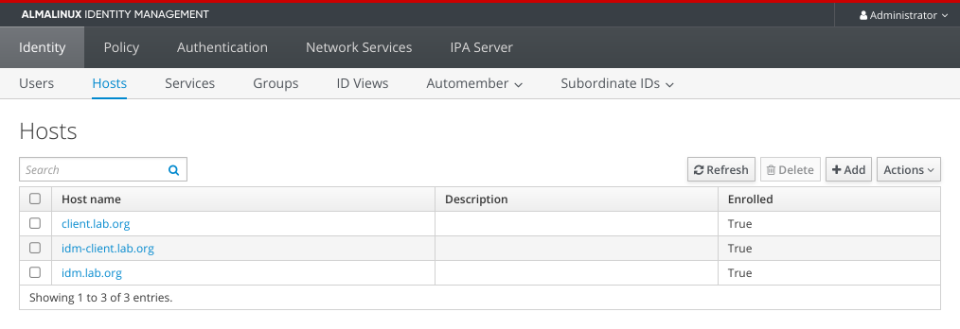
Now reboot your idm-client.lab.org and You should be able to login to it with FreeIPA/IDM account.
host # ssh vermaden@10.0.0.233
(vermaden@10.0.0.233) Password:
Last login: Wed Mar 6 07:04:42 2024
vermaden@idm-client:~ $ id
uid=1374600003(vermaden) gid=1374600000(admins) groups=1374600000(admins)
vermaden@idm-client:~ $ klist
Credentials cache: FILE:/tmp/krb5cc_1374600003
Principal: vermaden@LAB.ORG
Issued Expires Principal
Mar 6 07:04:34 2024 Mar 7 06:19:19 2024 krbtgt/LAB.ORG@LAB.ORG
vermaden@idm-client:~ $ sudo -i
Password for vermaden@LAB.ORG:
root@idm-client:~ # id
uid=0(root) gid=0(wheel) groups=0(wheel),5(operator)
FreeBSD 14.0-STABLE Client – Debug Commands
Below are some commands that you may (or may not) find useful.
root@idm-client:~ # sssctl user-checks vermaden
user: vermaden
action: acct
service: system-auth
SSSD nss user lookup result:
- user name: vermaden
- user id: 1374600003
- group id: 1374600000
- gecos: Vermaden Nedamrev
- home directory: /home/vermaden
- shell: /bin/sh
Unable to connect to system bus!
InfoPipe User lookup with [vermaden] failed.
testing pam_acct_mgmt
pam_acct_mgmt: Success
PAM Environment:
- no env -
root@idm-client:~ # ldapsearch -H ldap://idm.lab.org -x -b "" -s base -LLL supportedSASLMechanisms
dn:
supportedSASLMechanisms: EXTERNAL
supportedSASLMechanisms: GSS-SPNEGO
supportedSASLMechanisms: GSSAPI
supportedSASLMechanisms: DIGEST-MD5
supportedSASLMechanisms: CRAM-MD5
supportedSASLMechanisms: LOGIN
supportedSASLMechanisms: PLAIN
supportedSASLMechanisms: ANONYMOUS
root@idm-client:~ # ldapsearch -x -v -W -D 'cn=Directory Manager' uid=vermaden
ldap_initialize( )
Enter LDAP Password:
filter: uid=vermaden
requesting: All userApplication attributes
# extended LDIF
#
# LDAPv3
# base (default) with scope subtree
# filter: uid=vermaden
# requesting: ALL
#
# search result
search: 2
result: 32 No such object
# numResponses: 1
root@idm-client:~ # ldapsearch -Y GSSAPI -Omaxssf=0 -H ldaps://idm.lab.org -b dc=lab,dc=org CN=vermaden
SASL/GSSAPI authentication started
SASL username: vermaden@LAB.ORG
SASL SSF: 0
# extended LDIF
#
# LDAPv3
# base with scope subtree
# filter: CN=vermaden
# requesting: ALL
#
# vermaden, groups, compat, lab.org
dn: cn=vermaden,cn=groups,cn=compat,dc=lab,dc=org
objectClass: posixGroup
objectClass: ipaOverrideTarget
objectClass: ipaexternalgroup
objectClass: top
gidNumber: 1374600003
ipaAnchorUUID:: OklQQTpsYWIub3JnOjcyN2FlMjM2LTMyMTktMTFlZS04OGMyLTU4OWNmYzA4MW
QzNQ==
cn: vermaden
# vermaden, groups, accounts, lab.org
dn: cn=vermaden,cn=groups,cn=accounts,dc=lab,dc=org
objectClass: posixgroup
objectClass: ipaobject
objectClass: mepManagedEntry
objectClass: top
cn: vermaden
gidNumber: 1374600003
description: User private group for vermaden
mepManagedBy: uid=vermaden,cn=users,cn=accounts,dc=lab,dc=org
ipaUniqueID: 727ae236-3219-11ee-88c2-589cfc081d35
# search result
search: 4
result: 0 Success
# numResponses: 3
# numEntries: 2
Thats it – you have FreeBSD 14.0-STABLE connected to FreeIPA/IDM server.
Summary
Let me know in comments how it went.
EOF


